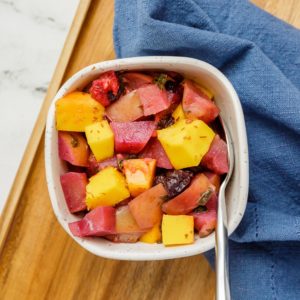
Breakfast fruit never tasted so good. This recipe creates a nice warm breakfast for those cold winter mornings.
Start your day off right with this delicious and healthy Baked Apple and Berry Breakfast recipe. Made with fresh apples and mixed berries, this dish is the perfect balance of sweet and tart flavors, combined with a crunchy texture.
Baked to perfection, this dish is both filling and satisfying, making it a great choice for breakfast or brunch. It can be festive, it can be an everyday treat, and not only does it taste great, but it's also packed with nutrients, making it a perfect way to fuel your body for the day ahead.
An Apple A Day
Apples are a highly nutritious fruit that are rich in antioxidants, fiber, vitamins, and minerals. They are low in calories and high in fiber, making them a great snack option for those watching their weight. The antioxidants in apples, including Vitamin C and polyphenols, help to protect against cellular damage, reducing the risk of chronic diseases like heart disease, cancer, and diabetes.
Apples also contain phytonutrients that have anti-inflammatory properties, which can help to reduce the risk of various diseases, including asthma and osteoporosis. Overall, apples are a great addition to a healthy diet, and their versatility makes them a convenient and delicious choice for people of all ages.

Apple Abundance
There are over 7,000 varieties of apples grown worldwide. Some of the most common types include Red Delicious, Granny Smith, Gala, Honeycrisp, and Fuji.
In terms of nutrition, all apples are a good source of fiber, Vitamin C, and antioxidants. However, some of the most nutritious types include the Pink Lady, which is high in fiber and antioxidants, and the Braeburn, which is high in Vitamin C.
The nutrient content can also vary depending on how the apple is grown and stored, so it is best to choose fresh, locally grown apples when possible.
Apples for Blood Glucose Control
Apples can be part of a healthy diet for people with diabetes, as long as they are consumed in moderation.
Apples score relatively low on both the glycemic index (GI) scales and the glycemic load (GL) scales, with a score of 40 and 6 respectively. This means that they should cause a minimal rise in blood sugar levels (10). Apples have a minimal effect on blood sugar levels and are unlikely to cause rapid spikes in blood sugar, even in those with diabetes.
Additionally, the fiber content in apples can help to slow down digestion and reduce spikes in blood sugar levels.
Add in Some Blueberries
Blueberries are a superfood that are packed with nutrients and health benefits. They are an excellent source of antioxidants, including anthocyanins, which have been shown to have anti-inflammatory and anti-cancer properties.
Blueberries are also a good source of vitamins C and K, and they contain dietary fiber, which can help to support digestive health and regulate blood sugar levels. Blueberries have a GI of 53 and a GL of 7.2. In addition, blueberries are low in calories and high in nutrients, making them a great snack option for people trying to maintain a healthy weight.
Studies have also shown that blueberries may help to improve cognitive function, lower blood pressure, and reduce the risk of heart disease and other chronic diseases. Overall, blueberries are a delicious and nutritious addition to any diet.

Blueberries and Diabetes
Blueberries can be a healthy choice for people with diabetes. Blueberries have a low glycemic index (GI) which means they have a minimal impact on blood sugar levels, making them a good option for people with diabetes.
Additionally, the high fiber and antioxidant content in blueberries can help to regulate blood sugar levels and reduce the risk of cardiovascular disease, which is a common complication of diabetes.

Shopping & Storing Blueberries
To select the best blueberries at the grocery store, follow these tips:
Look for plump, firm, and uniformly colored berries with a deep blue hue.
Avoid berries that are soft, mushy, or have any signs of mold.
Check for any juice stains or moisture on the container, as this can be a sign of overripe or spoiled berries.
To store blueberries properly:
Remove any stems or leaves, and place the berries in a single layer in an airtight container.
Store the container in the refrigerator, where the berries will keep fresh for up to one week.
Note: It's best to avoid washing the berries before storing, as moisture can cause them to spoil more quickly. If you have excess berries, you can freeze them for later use in smoothies or baked goods.


Baked Apple and Berry Breakfast
Ingredients
- 2 medium apples - chopped
- 2 cups spinach - chopped
- 1/2 cup blueberries
- 1/2 cup raspberries
- 2 tbsp raisins
- 1 tsp cinnamon
- 1/2 tsp nutmeg
- 1/4 cup almond milk - or your favorite plant-based beverage, such as soy or oat
- 1 tsp ground flaxseed
- 1/2 medium mango - cubed
Instructions
- Preheat the oven to Bake at 400 degrees F.
- Mix the apple, chopped spinach and raisins into a baking dish. Top with berries. Sprinkle it with cinnamon and nutmeg. Cover with foil and cook for 45 minutes.
- Meanwhile, prepare the mango.
- Once the apple berry mixture is cooked top with milk, mango and flaxseed.

